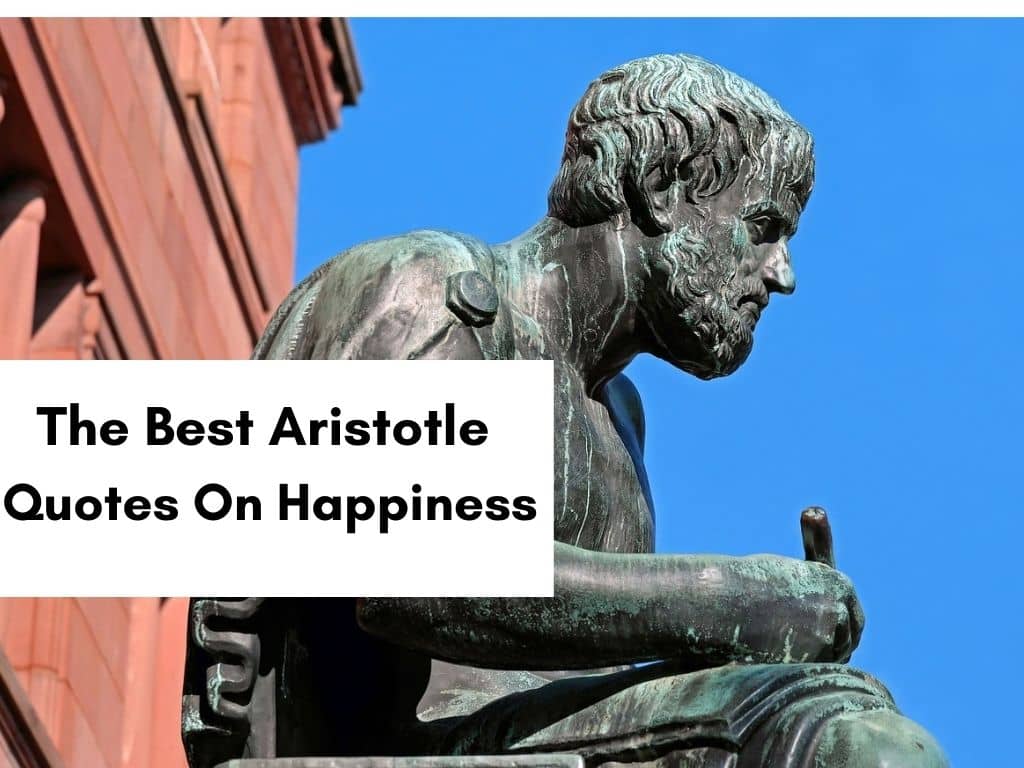Aristotle quoted that “Happiness is a quality of the soul…not a function of one’s material circumstances.” And I feel this is true because happiness is an eternal feeling, a laughing person can’t be happy if he/she is eternally happy. Check out the best Aristotle quotes on happiness to understand the different meanings of happiness.
In this post, I’ve also included Artitotle happiness image quotes, happiness quotes by Aristotle from his book The Nicomachean Ethics. So keep reading this.
Aristotle Quotes On Happiness
Happiness is the meaning and purpose of life, the whole aim, and the end of human existence.
― Aristotle
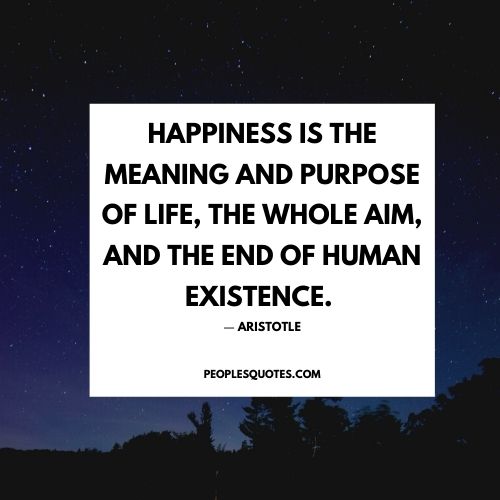
Happiness consists in achieving, through the course of a whole lifetime, all the goods — health, wealth, knowledge, friends, etc. — that lead to the perfection of human nature and to the enrichment of human life. This requires us to make choices, some of which may be very difficult.
― Aristotle
Happiness is not pleasure, nor is it virtue. It is the exercise of virtue.
― Aristotle
Happiness cannot be achieved until the end of one’s life. Hence it is a goal and not a temporary state.
― Aristotle
Happiness is the perfection of human nature. Since man is a rational animal, human happiness depends on the exercise of his reason.
― Aristotle
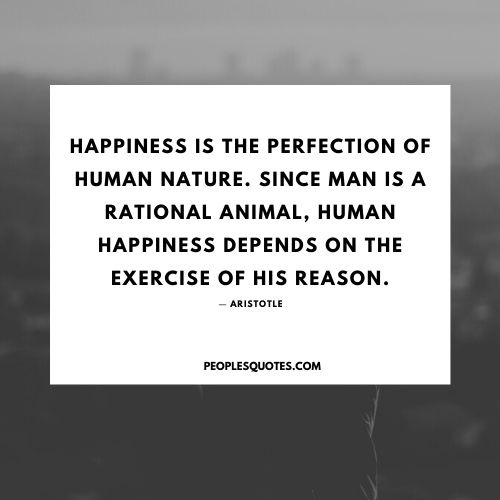
Happiness depends on acquiring a moral character, where one displays the virtues of courage, generosity, justice, friendship, and citizenship in one’s life. These virtues involve striking a balance or “mean” between an excess and a deficiency.
― Aristotle
Happiness requires intellectual contemplation, for this is the ultimate realization of our rational capacities.
― Aristotle
“There is one end we all have – not in virtue of being rational, but simply in virtue of being a human being – and that is happiness.”
― Aristotle
“The end toward which all human acts are directed is happiness.”
― Aristotle
“Whatever creates or increases happiness or some part of happiness, we ought to do; whatever destroys or hampers happiness, or gives rise to its opposite, we ought not to do.”
― Aristotle
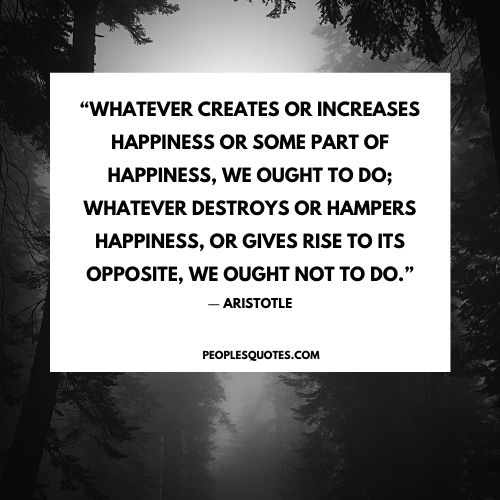
“Happiness is the exercise of talent, along the lines of excellence.”
― Aristotle
“Happiness extends just as far as study extends, and the more someone studies, the happier he is…”
― Aristotle
Quotes by Aristotle on Happiness
Human beings cannot achieve happiness or even something that approximates happiness unless they live in communities that foster good habits and provide the basic equipment of a well-lived life.
― Aristotle
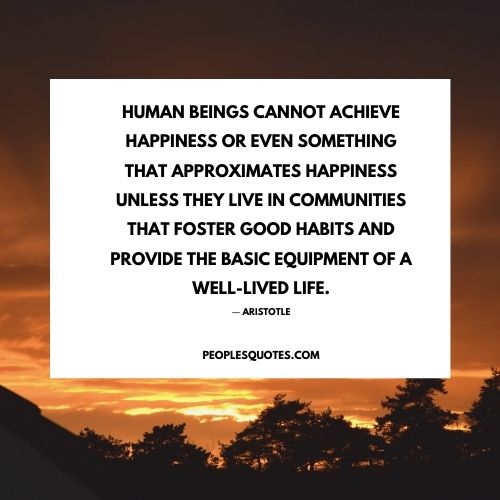
The pursuit of one’s own happiness requires ethically virtuous activity and will therefore be of great value not only to one’s friends but to the larger political community as well.
― Aristotle
Human happiness does not consist in every kind of pleasure, but it does consist in one kind of pleasure—the pleasure felt by a human being who engages in theoretical activity and thereby imitates the pleasurable thinking of god.
― Aristotle
“If happiness is an activity in accordance with excellence, it is reasonable that it should be in accordance with the highest excellence.”
― Aristotle
“Happiness depends upon ourselves.”
― Aristotle
“Happiness is a quality of the soul…not a function of one’s material circumstances.”
― Aristotle
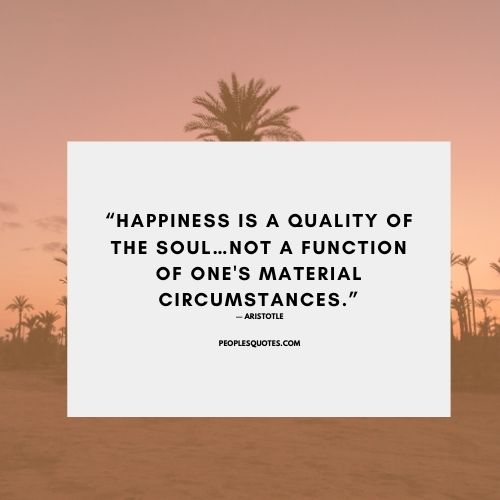
“Happiness belongs to the self-sufficient.”
― Aristotle
“The cultivation of the intellect is man’s highest good and purest happiness”
― Aristotle
“Happiness belongs to those who suffice themselves.”
― Aristotle
Aristotle quotes about happiness
Virtues—courage, justice, and the like—are components of happiness, which is something we should be able to better understand only at a later point.
― Aristotle
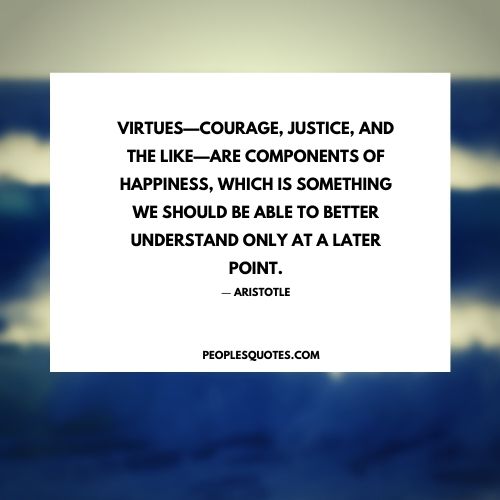
Happiness consists in exercising some skills or other, but that the moral skills of a virtuous person are what one needs is not a proposition that can be established on the basis of argument.
― Aristotle
The function of man is to live a certain kind of life, and this activity implies a rational principle, and the function of a good man is the good and noble performance of these, and if any action is well performed it is performed in accord with the appropriate excellence: if this is the case, then happiness turns out to be an activity of the soul in accordance with virtue.
― Aristotle
“One swallow does not make a summer, neither does one fine day; similarly one day or brief time of happiness does not make a person entirely happy.”
― Aristotle
“Happiness is the meaning and the purpose of life, the whole aim, and end of human existence.”
― Aristotle
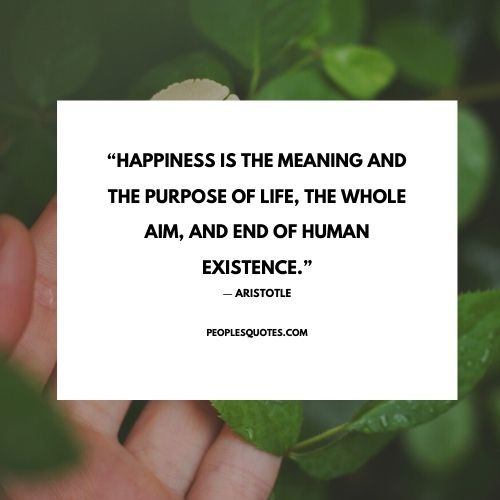
“All human happiness or misery takes the form of action; the end for which we live is a certain kind of action.”
― Aristotle
“Therefore the activity of God, which surpasses all others in blessedness, must be contemplative; and of human activities, therefore, that which is most akin to this must be most of the nature of happiness”
― Aristotle
“Good character is the indispensable condition and chief determinant of happiness, itself the goal of all human doing. The end of all action, individual or collective, is the greatest happiness of the greatest number.”
― Aristotle, Ethics
Aristotle quotes on happiness Nicomachean ethics
He is happy who lives in accordance with complete virtue and is sufficiently equipped with external goods, not for some chance period but throughout a complete life. (Nicomachean Ethics, 1101a10)
― Aristotle, The Nicomachean Ethics

“Happiness does not lie in amusement; it would be strange if one were to take the trouble and suffer hardship all one’s life in order to amuse oneself”
― Aristotle, The Nicomachean Ethics
“Happiness then is found to be something perfect and self-sufficient, being the end to which our actions are directed.”
― Aristotle, The Nicomachean Ethics
“The happy life is thought to be one of excellence; now an excellent life requires exertion, and does not consist in amusement. If Eudaimonia, or happiness, is an activity in accordance with excellence, it is reasonable that it should be in accordance with the highest excellence; and this will be that of the best thing in us.”
― Aristotle, The Nicomachean Ethics
Friendship is one of the most important virtues in achieving the goal of happiness.
― Aristotle, The Nicomachean Ethics
“Happiness is a kind of activity of the soul; whereas the remaining good things are either merely indispensable conditions of happiness, or are of the nature of auxiliary means, and useful instrumentally.”
― Aristotle, The Nicomachean Ethics
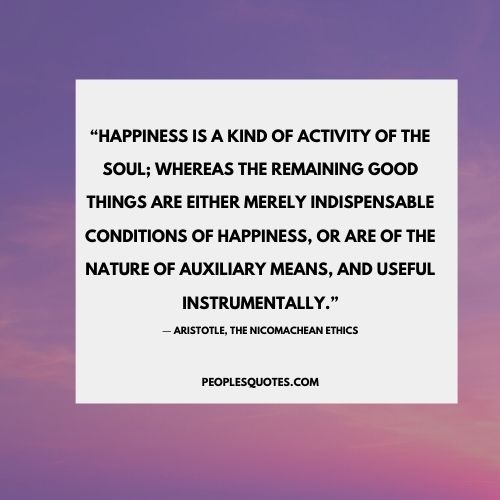
“Verbally there is very general agreement; for both the general run of men and people of superior refinement say that it is happiness, and identify living well and doing well with being happy; but with regard to what happiness is they differ, and the many do not give the same account as the wise.”
― Aristotle, The Nicomachean Ethics
“If it is better to be happy as a result of one’s own exertions than by the gift of fortune, it is reasonable to suppose that this is how happiness is won.”
― Aristotle, The Nicomachean Ethics
“Happiness also requires external goods in addition.”
― Aristotle, The Nicomachean Ethics
“Happiness, therefore, being found to be something final; and self-sufficient, is the end at which all actions aim.”
― Aristotle, The Nicomachean Ethics
“Happiness is at once the best, the noblest, and the pleasantest of things.”
― Aristotle, The Nicomachean Ethics
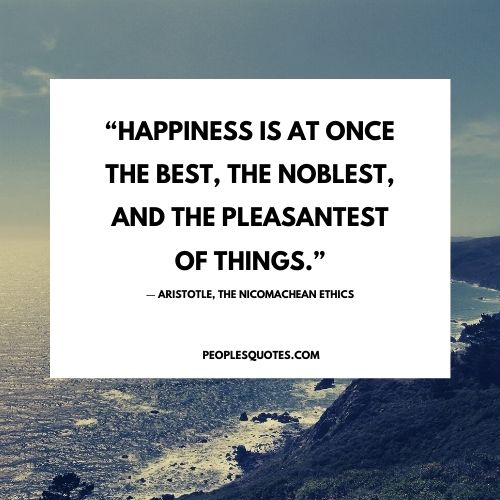
“Happiness seems to depend on leisure, because we work to have leisure, and wage war to live in peace.”
― Aristotle, The Nicomachean Ethics
“Happiness requires both complete goodness and a complete lifetime.”
― Aristotle, The Nicomachean Ethics
“Happiness above all seems to be of this character, for we always choose it on account of itself and never on account of something else. Yet honor, pleasure, intellect, and every virtue we choose on their own account—for even if nothing resulted from them, we would choose each of them—but we choose them also for the sake of happiness, because we suppose that, through them, we will be happy.”
― Aristotle, Nicomachean Ethics
“Happiness, then, extends as far as contemplation, and the more contemplation there is in one’s life, the happier one is, not incidentally, but in virtue of the contemplation, since this is honorable in itself. Happiness, therefore, will be some form of contemplation.”
― Aristotle, Nicomachean Ethics
“The many, the most vulgar, would seem to conceive the good and happiness as pleasure, and hence they also like the life of gratification. Here they appear completely slavish, since the life they decide on is a life for grazing animals.”
― Aristotle, Nicomachean Ethics
Wisdom produces happiness by being a part of virtue, and that practical wisdom looks to the development of theoretical wisdom and issues command for its sake. So it is clear that exercising theoretical wisdom is a more important component of our ultimate goal than practical wisdom.
― Aristotle, The Nicomachean Ethics
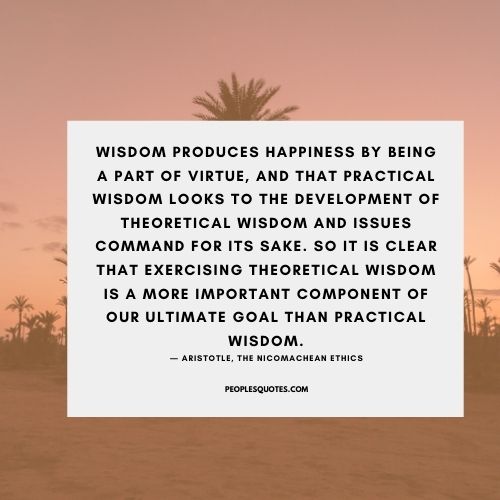
References

I’m Murshid Akram, a introvert who love reading and sharing positive vibes through quotes and sayings. I believe with love and compassion we can make this world a better place.

